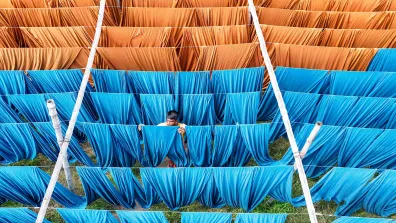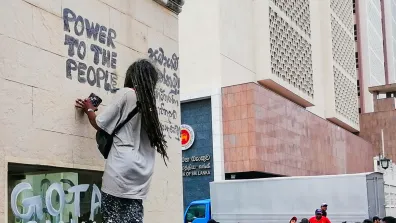Sweatshops in Bangladesh

The Bangladeshi garment industry generates 80% of the country’s total export revenue. However, the wealth generated by this sector has led to few improvements in the lives of garment workers, 85% of whom are women.
The majority of garment workers in Bangladesh earn little more than the minimum wage, set at 3,000 taka a month (approximately £25), far below what is considered a living wage, calculated at 5,000 taka a month (approximately £45), which would be the minimum required to provide a family with shelter, food and education.
As well as earning a pittance, Bangladeshi factory workers face appalling conditions. Many are forced to work 14-16 hours a day seven days a week, with some workers finishing at 3am only to start again the same morning at 7.30am. On top of this, workers face unsafe, cramped and hazardous conditions which often lead to work injuries and factory fires. Since 1990, more than 400 workers have died and several thousand more have been wounded in 50 major factory fires. Sexual harassment and discrimination is widespread and many women workers have reported that the right to maternity leave is not upheld by employers. Factory management also take steps to prevent the formation of trade unions, a right protected under the Freedom of Association and Collective Bargaining ILO Conventions, which Bangladesh ratified in 1972.
The National Garment Workers' Federation (NGWF) has been fighting for the rights of garment workers in Bangladesh since 1984. Based in Dhaka, the country’s capital, and with 7 branches nationwide, it is the largest trade union federation in the Bangladeshi garment sector, with more than 27,000 members. Women workers are at the frontline of the movement with women making up 18 of the 30 members of the NGWF’s central executive committee. The NGWF is a founding member of the Bangladesh Garment Workers Unity Council, an umbrella organisation of 21 garment worker federations, and is also a member of the arbitration committee, a body that negotiates labour law and cases of workers’ rights violations through dialogue between trade unions, government and factory owners.
The NGWF is working hard to strengthen the trade union movement across Bangladesh by setting up factory-level unions challenging labour rights abuses within factories. It also promotes workers’ rights through targeted campaigning and by lobbying the government, factory owners and multinational corporations for stronger legislation and its enforcement. Finally the NGWF provides legal advice and carries out training sessions for workers around labour rights, particularly on women leadership.
The facts
- In 2010, there are more than 4,800 factories and 3.5 million people employed in the Bangladeshi garment industry, producing cheap clothes under appalling working conditions for major UK and international brands
- Women account for 85% of the textile work force and are particularly vulnerable to discrimination and abuse.
- The garment industry accounts for 80% of Bangladesh’s export revenue and is the fourth largest exporter of garments in the world.
- In December 2010 a new national minimum wage came into force, the first wage increase for 4 years. Previously, the lowest paid garment workers earnt a meagre £15 a month (1,662 taka) but they will now be able to earn £25 a month (3,000 taka), an increase of 80%. However this is still short of a living wage, calculated to be £45 a month (5,000 taka).



